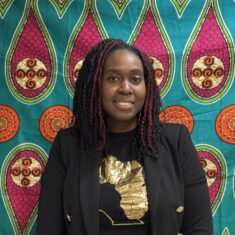
Natalie Smith, Eva’s Manager of Program Development and Partnerships
Homelessness is a difficult burden for any young person, but for Black youth, the challenges are compounded by systemic racism and discrimination. These added pressures not only limit access to stable work, housing, and education but also take a toll on their mental health, often leaving Black youth without the culturally relevant support they need to thrive.
At Eva’s, we are breaking down these barriers by addressing the unique mental health needs of Black youth through culturally responsive programs and services.
“Culture plays a significant role in how health care is received and provided. Being Black brings an added layer of challenges and struggles we navigate daily,” explains Natalie Smith, Eva’s Manager of Program Development and Partnerships.
Eva’s is committed to holistic, community-centred care. By partnering with organizations like Inner City Health Associates (ICHA), hosting on-site visits with a psychiatrist, and collaborating with Black psychotherapists from The Thriving Roots Wellness Collective Group, we are providing young people with care that resonates with their lived experiences.
For newcomer or refugee youth, the challenges of navigating an unfamiliar system—sometimes as basic as learning the TTC—add an additional layer of stress. To ease their transition, Eva’s provides life-skills programs and community integration support to help them find stability and belonging in their new home.
This year, during Black Mental Health Week (March 2–9), Eva’s collaborated with Taibu Community Health Centre and Caribbean African Canadian Social Services (CAFCAN) to host a range of workshops and activities that nurtured both mental and physical well-being. From Socasize workouts to haircare workshops, these initiatives celebrated the cultural and community-based elements of self-care.
“Haircare and presentation are deeply rooted in our identity as a community. How we care for our hair reflects our self-esteem and well-being. Physical activity, like Socasize, is equally vital—it boosts our mood, self-esteem, and reduces stress,” Natalie shared.
By providing culturally relevant care, programs like this foster belonging and stability for Black youth to overcome challenges.
